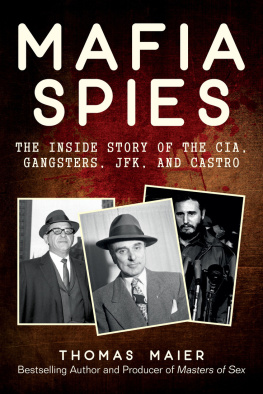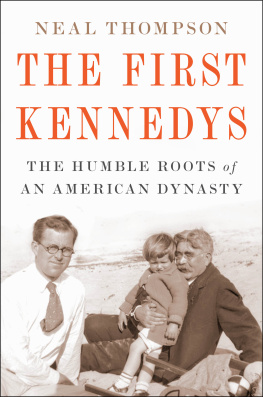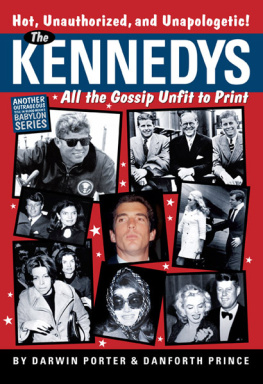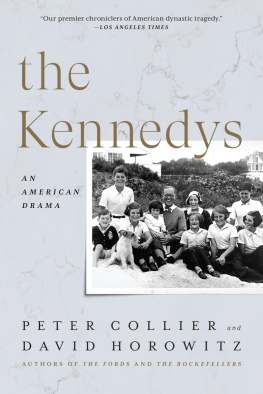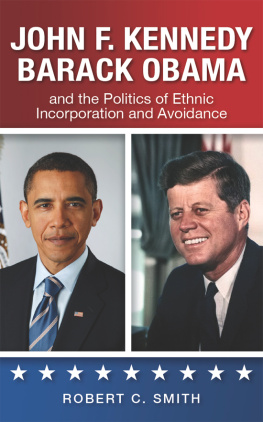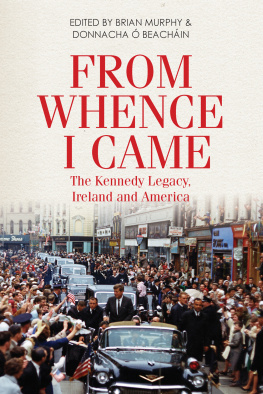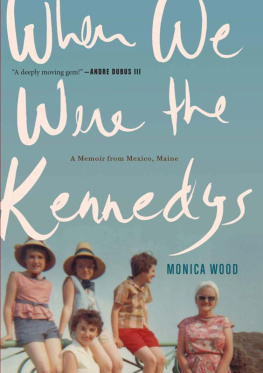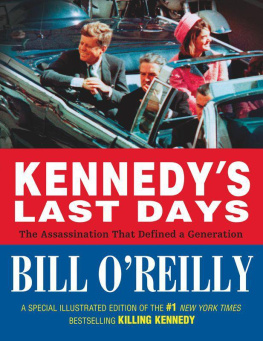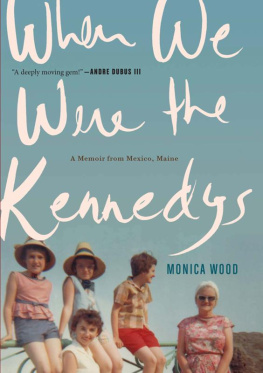The Kennedys
Also by Thomas Maier
D R. S POCK: A N A MERICAN L IFE
N EWHOUSE:
A LL THE G LITTER, P OWER AND G LORY
OF A MERICAS R ICHEST M EDIA E MPIRE
AND THE S ECRETIVE M AN B EHIND I T
The Kennedys
Americas Emerald Kings
T HOMAS M AIER
Copyright 2003 by Thomas Maier
Published by Basic Books,
A Member of the Perseus Books Group
All rights reserved. Printed in the United States of America. No part of this book may be reproduced in any manner whatsoever without written permission except in the case of brief quotations embodied in critical articles and reviews. For information, address Basic Books, 387 Park Avenue South, New York, NY 10016-8810.
Designed by Lovedog Studio
Library of Congress Cataloging-in-Publication Data
Maier,Thomas, 1956
The Kennedys :Americas emerald kings / Thomas Maier.
p. cm.
Includes bibliographical references and index.
ISBN 0-465-04317-8 (hardcover)
eBook ISBN: 9780786740161
1. Kennedy family. 2. Kennedy, John F. (John Fitzgerald), 1917-1963. 3. PoliticiansUnited StatesBiography. 4. Irish AmericansBiography. 5. Irish American families. 6. Catholics United StatesBiography. I.Title.
E843.M35 2003
973.922'092'2dc21
2003010426
DHSB 03 04 05 10 9 8 7 6 5 4 3 2
Photo credits: page xxii, 232, and 464: courtesy of The John F. Kennedy Library; frontispiece and page 358: courtesy of Timepix; page 92: courtesy of Kennedy family private collection.
To my sons
Drew, Taylor and Reade
All of us of Irish descent are bound together by the ties that come from a common experience; experience which may exist only in memories and in legend but which is real enough to those who possess it. The special contribution of the Irish, I believethe emerald thread that runs throughout the tapestry of their pasthas been the constancy, the endurance, the faith that they displayed through endless centuries of foreign oppressioncenturies in which even the most rudimentary religious and civil rights were denied to themcenturies in which their mass destruction by poverty, disease and starvation were ignored by their conquerors.
SEATOR JOHN F. KENNEDY, 1957
Be more Irish than Harvard.
ROBERT FROST,
INSCRIBED IN A BOOK OF POEMS
GIVEN TO JFK AT THE 1961
PRESIDENTIAL INAGURATION
Preface
Once I thought to write a history of the immigrants in America. Then I discovered that immigrants were America.
HISTORIAN OSCAR HANDLIN,
AS QUOTED BY JOHN F. KENEDY
IN A NATION OF IMMIGRANTS
W HEN MY CHILDREN ARE ASKED IN SCHOOL to draw a family tree, listing where their ancestors were born, the limbs cleave evenly between Ireland and Brooklyn.
My wifes family are all from Ireland, her father from the north and her mother from the south;my side of the family tree is rooted in several generations from Brooklyn, a mix of Irish Catholics, English and German Lutherans converted by marriage. Out there on one of the limbs is my maternal great-grandmother, ne Mary Kelly, of whom an apocryphal tale about being Irish Catholic in America was passed along to her children.
As the story goes, Mary Kelly, not far from the boat herself, was one of many Irish-Americans who admired New York Governor Al Smith, known for his progressive programs aimed at helping the citys immigrants ascend into the middle class. When Smith ran for president in 1928, Mary hoped the old bigotry would be set aside, allowing a well-qualified Catholic to be elected to the highest office in the land. Instead, Smith became mired in a Ku Klux Klanincited effort to scare self-respecting Americans from voting for a papist, a candidate who supposedly owed his allegiance to the anti-Christ in Rome and not his native land. The sheer hate faced by Smiths doomed candidacy shocked and saddened an entire generation of Irish Catholics. According to family lore, my great-grandmother, embittered by the experience, never voted again.
While researching this book, I was reminded of these hard feelings, once common among Irish Catholics, when I read the Kennedy letters and recollections about Smiths 1928 campaign. Both Joseph and Rose Kennedy were taken aback by the anti-Catholicism exhibited deep in the American heartland, and what Smiths crushing defeat meant for their familys future ambitions. They were still very mindful of Smith when their son, John F. Kennedy, announced his presidential candidacy in 1960.
Despite all their money and influence, the Kennedys, like thousands of other less powerful Irish Catholics, realized how far they had to go to become fully accepted in American society. Some well-regarded histories of the Kennedys dont even mention Al Smiths name. Yet only with Smith in mindplaced in the broader context of the American immigrant experiencecan their achievement be appreciated fully. For even now, John Kennedy remains the first and only person from a minority group ever elected president of the United States.
S INCE THEIR ARRIVAL IN THIS LAND, the Kennedys have been exemplars of the Irish Catholic immigrant experience in Americafrom Patrick and Bridget Kennedy of County Wexford fleeing famine-stricken Ireland among the great wave of emigrants in the 1840s, to JFKs barrier-breaking 1960 election to the American presidency, to efforts by Senator Edward Kennedy and U.S. Ambassador Jean Kennedy Smith to bring peace in the 1990s to their ancestral homeland. Their sense of being Irish, of being Catholic, and of being members of a family coming from an often oppressed immigrant minorityindeed the very Irish notion of a Kennedy clan, as they often referred to themselvescarried through from one generation to the next.
Most early histories and biographies of the Kennedys mirrored the storybook image that the family projected to achieve power. The popular notion of JFK as a Harvard-educated Anglophile, an almost perfect creation of Americas melting pot, fit neatly with prevailing theories of assimilation. None of the old stereotypes about Irish politicians seemed to apply here. As a result, dozens of Kennedy books routinely ignored, or gave only a passing nod, to the underlying forces of ethnicity and religion that so often affected the Kennedy familys actions and outlook. Only with the passage of time, and the recent availability of many personal documents at the John F. Kennedy Presidential Library, does a more complete and accurate portrait emerge. Rather than presenting another Camelot fable, this book reexamines the Kennedy saga by exploring the subtle nuances of these cultural factors on their lives. In doing so,we gain a fresh understanding into the Kennedys sense of their own Irish immigrant heritage, their historic encounters with religious bigotry and how the complex dynamics of their family life reflected the Irish Catholic experience in America. Many new insights, unexamined events and previously unknown but influential people come to light for the first time in the familiar story.
As the documents quoted in this book show, the Kennedy relationship with the Roman Catholic Church was far more extensive than the public perceived of the 1960 presidential candidate, elected as he was by vowing a strict separation between church and state. Private letters illustrate the familys deep political and financial ties to the church, both in America and with the Popes right-hand man at the Vatican. These documents detail Joe Kennedys secret dealings between President Franklin D. Roosevelt and the future Pope Pius XII, why he felt that FDR harbored a bias against Catholics like himself and how the Kennedys battled behind the scenes with the churchs hierarchy during JFKs historic presidential campaign. Joe Kennedys decades-long friendship with the suave, discreet Vatican administrator, Count Enrico Galeazzi (GALL-a-zee, as Jean Kennedy Smith pronounces it), offers a fascinating venue into the Kennedy familys influence in Rome. Their correspondence during the 1960 presidential campaign provides a running commentary on the familys frustration with anti-Catholic bigotry and anger with the conservative bishops in their own churchsomething the Kennedys dared not show to the American public.


